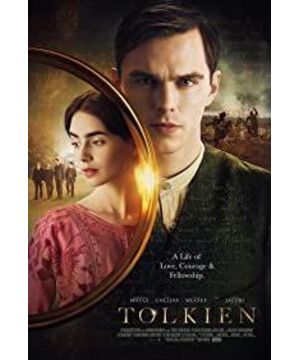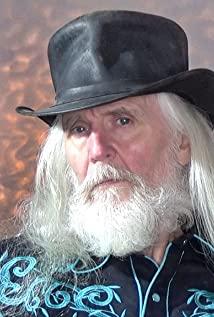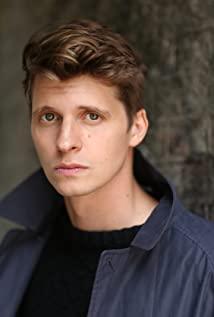Language comes from history, and stories come from life!
There are many movies that have become classics, but there are not many that can shock people. The Lord of the Rings and The Matrix are godlike beings.
And Tolkien is the original author of "The Lord of the Rings" and "The Hobbit", and this film is his biography. To be honest, this movie is very mediocre, but for Tolkien, it must also become the object of careful consideration by movie lovers.
When I first watched "The Lord of the Rings", it was only derived from the primitive superstition (animism) that existed in human nature, and then was led by various complex clues, led by various grievances and hatreds, and finally immersed in "reading wars in The release of Zhuolu". I was also obsessed with the theme song "May it be" at the beginning (and still loves it the most), and even deliberately checked the unclear words, only to know that these words are the origin of learning "The Lord of the Rings". Author, coined "language". I was so amazed that I checked Tolkien's information at the time and learned that he was not only a professor of linguistics at Oxford, but also that in the original book, he created different languages for different races. To put it simply, it’s like we Chinese, you speak Hokkien, he speaks vernacular, I speak Chaozhou, but we can communicate with each other in Mandarin, and we can roughly guess and understand each other according to the laws of language, to understand each other if.
Why create a language? I remember a story (forgot the source): a lonely old man, because of his loneliness, created a language for himself, probably calling the table the bread, the bread the plate, and the plate the table. Of course he went crazy in the end, because he was even more unable to communicate with outsiders. So creating a language yourself is a foolish thing to do. But as a linguist, why did Tolkien create language for the story world he created?
First, he likes to create. Create a story, create a world, then why not create a language. Tolkien created a "Middle-earth", a world where humans, elves, dwarves, orcs, and even the undead coexist, so to be real, they all have to have their own language. Because a language must have a culture and history behind it. In the same way, with its culture and history, it must have its language.
Tolkien, educated by his mother, was obviously a linguist (or language lover, proficient in many languages), so when he and his younger brother were orphaned and needed to rely on others, the priest recommended: they Their mother taught them at home, and they are now fluent in multiple languages. And from the film we can see that his mother's teaching materials are those old stories, because these stories are old, so their language is also old (as we know English, it has actually changed, and changed a lot). And these ancient languages are tied to those myths (imagine a parent and their children speaking ancient myths in ancient Chinese and ancient dialects all day long), so Tolkien has always had an ancient world of myths alive in his heart.
So, when Tolkien was expelled from school (on the grounds that he had no talent for the humanities), he turned to Professor Wright, who taught Gothic, to join his class on linguistics. He said to Wright this way: I have been fascinated by language since I was a child, and I was obsessed with it, and I invented my own language, a complete and comprehensive language, please see. This is, everything. From Breost-hord, my heart. Treasure inside. (What are these paintings?) I made up stories, legends. After all, what is the purpose of language? It's not just naming things, right? It is the lifeblood of a culture and a nation.
This is a complete understanding of Tolkien's creation of the story and the language for it. Of course, how to understand language is the lifeblood of culture, and the film gives a vivid description. In order to let the audience understand the screenwriter and director's research and understanding of Tolkien's language, they designed two dialogues, which unfolded for us layer by layer.
One is when Tolkien talks to his sweetheart Edith. Tolkien showed off the language he created:
Tolkien: ... (Tolkien rambled on for a while)
Edith: What do you mean?
Tolkien: It's all nonsense, it's about an old man who watches an unfortunate frog who can't land softly and ends up being eaten by a dog.
Edith: Did you invent it?
Tolkien: Yes.
Edith: Is it the whole language?
Tolkien: Verb structure, vocabulary, everything!
Then, Edith proved through practice that what is more important in language is not speech but connotation.
Edith: Hand, that might be a beautiful word.
Tolkien: Indeed.
Edith: But combined with the associations we have, it has a deeper meaning, touching (touching Tolkien's hand with one's own hand, we can understand what this means for Tolkien who is in first love) feeling). Beautiful words are not beautiful because of their pronunciation, but because of their meaning.
The second is based on Professor Wright's guidance to Tolkien and Tolkien's comprehension.
Professor Wright put it this way: Children refer to objects and are taught one word - tree. Later, he learned to distinguish this tree from other trees, and he learned the specific name of this tree. He played under the tree, danced around the tree, stood under the branches to protect the sun from the rain; he kissed under the tree, slept under the tree, married under the tree; Stumbled past. It is said that a king hid in a tree, perhaps a ghost lived under the bark, this unique leaf, carved on the tomb or monument of his landowner, this wood may have built the building that saved his ancestors from aggression galleon. All this universal and particular, national and personal, all that he knew, the feeling he had experienced, the spirit of revival, was inexplicably articulated, albeit faintly, in a single voice: Oak! Saxon vocabulary, Proto-Germanic, cognate in Old Norse: Eik. Language is never meaningless. Language is full of meaning, full of history, and layers upon layers. What is a meaningless word? It's just a pronunciation.
Then, Tolkien came to his senses, he said: I have been thinking about the word "oak", its symbolism, the tree of the patron saint, the omens of change.
Language is more than the superficial "pronunciation" and the "grammar" rules behind it. There is also its history and origin, and there is a real life experience perception and interpersonal interaction.
Second, he was obsessed with phonology. On his first day in middle school, he corrected a language teacher's mistake about his name. For the first time, he asked Edith about his endeavours: My next language will be more pleasant, the accepted word that sounds pleasant - Cellar door, the sinking of the tone, the curvature of the lips, the cellar The door, if you repeat it over and over again, it will sound... magic.
Clearly this reflects his interest in phonology. Just like "Gandalf (Gundor)" in The Lord of the Rings, we all think such a name is so strange, but thinking about it now, Tolkien must have been very satisfied when he coined the word, full of magical connotations , just like when we called Li Bai to be Li Taibai, the immortal qi suddenly increased. Just like the dialogue between King Hui of Liang and Mencius, King Hui of Liang said at the very beginning: "A few people are in the country, I will give my heart to my ears." Compared with our modern Chinese, "I have also devoted my heart to this country." The number of words is almost not worse. However, there are several empty words in "a few people are devoted to the country", and only the king can say such graceful and luxurious words, and only when he is not very interested in Confucianism at the beginning, can such a disdainful tone emerge. The length, height and clarity of the rhyme contain different thoughts and emotions.
So, when Tolkien resented being expelled, drinking and cursing in the middle of the night, half of Oxford heard a new language. Then he had this conversation with Professor Wright about drinking and scolding the streets this time:
Tolkien: A language I created for elves.
Wright: I seem to hear some Finnish.
Tolkien: Yes, I stole a lot of Finnish.
Wright: Not stealing, not language never stealing.
Human language is like this, but what about elf language? What about the language of the dwarves? Orc language? Although they are all languages, just as ancient English was regarded as a crude language by orthodox Latin, although it is also a European language, some languages appear clear, some appear vague, some appear rough, and some appear delicate. There is such a saying in the Chaoshan area, "The Chaozhou people are good at scolding, but the Chaoyang people are not good at talking (rather quarrel with the Chaozhou people than talk to the Chaoyang people)", it is because the Chaozhou people speak the Chaozhou dialect softly and mildly. People speak Chaozhou dialect that is heavier and stiffer (of course, according to research, the Chaozhou dialect spoken by Chaoyang people is more in line with the orthodoxy of ancient Chaozhou dialect). Obviously, Finnish is lighter and more delicate, which is in line with the characteristics of the elves, so Tolkien's Elvish "stealed" a lot of Finnish. Reconnecting with the above, we can hear the Oak and Eik of Oak, and the two pronunciations of Oak and Eik are obviously different from voicing and clear. If it is a half-orc, it must say Orc, and the elves naturally have to say Oke. Although we usually don't pay attention, in fact, if the orcs and the elves say the same thing, then it is really a dialogue without a soul except for the appearance.
Finally, we can clearly understand where Tolkien's story came from. In fact, those "dragons", those "heroes", those "magic", those stories about "treasures and curses", from the beginning, were the stories told by his mother, and the musicals he listened to, which were originally ancient European Culture, Tolkien is just a culmination. As for the core of the story, he lost his husband and mother in his early years, he was dependent on others, he met his sweetheart, and he met three good friends. Everyone pursues each other's ideals (some love poetry, some love painting, some love composing, while he loves language and stories, and his sweetheart likes piano playing), but everyone seems to be unable to go the way they want to go (parents don't like it) children engage in these "arts"). We use friendship and support each other to spend a happy time with each other. His obsession with Edith, and the priest's urging of his studies, forced him to temporarily put aside his love for the sake of his studies, which also made Edith suspicious of him, and even accepted marriage proposals from others (of course, this may have always been the Dess' Lies), enough for Tolkien to endure emotional torture. Later, due to academic setbacks, he was expelled from the school, and because of a chance encounter with Professor Wright, he turned to find his own interest and talent in linguistics. Later, because of World War II, he and his friends all went to the battlefield, and two of them died for the country. He and another friend survived, but since then they have had a different impact on life. The friend basically stopped creating, but Tolkien used creation to show the world in his heart and the experience of life.
Therefore, we can also say that the real classic is timeless and new. The reason why the classic works of art can reach the realm that other people can't achieve is because of painstaking efforts, and only painstaking efforts can be achieved alone. The painstaking effort comes from sincere feelings, and because those feelings are unforgettable, people are willing to spend a lifetime to display them perfectly, just like Tolkien is willing to write a story about adventure, friendship, and love, and is more willing to create for the characters. Language is the same. Because it's worth it! 19.8.18
View more about Tolkien reviews











